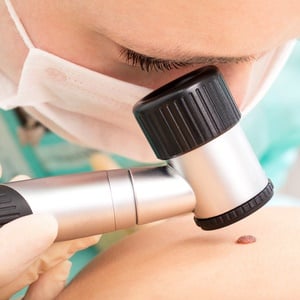
Have you ever panicked over a mole on your skin that looked a little strange, only to be assured that it's nothing to worry about?
Contrary to what you might think, moles are not the most likely place for a deadly melanoma to develop, a new analysis shows.
New lesions
In fact, a review of 38 previously published medical studies involving more than 20 000 melanomas showed that only 29% of the skin cancers started in moles patients already had, while 71% arose as new lesions on the skin.
"Patients and physicians should be aware that skin without moles is more at risk than moles to develop a melanoma," said lead researcher Dr Riccardo Pampena. He is with the dermatology and skin cancer unit at Arcispedale Santa Maria Nuova, Istituto di Ricovero e Cura a Carattere Scientifico at Reggio Emilia in Italy.
Melanomas that arise on their own also tend to be more aggressive than melanomas associated with moles, suggesting the two types of malignancies might be different, Pampena added.
But don't ignore your moles
Regardless, dermatologists should always do complete skin examinations and follow up any atypical moles, Pampena stressed.
"Not only moles, but the whole-body surface should be monitored by patients and physicians," Pampena said.
Health24 mentions that about one in 10 people has a mole that looks different from ordinary moles and that it's important to notice the differences of irregular moles: you should be checking the colour, shape, surface and size.
This report was published in the Journal of the American Academy of Dermatology.
Check for new moles
Dr Victoria Sharon, a dermatologist at Northwell Health in Manhasset, New York, agreed that patients need to be on the lookout for any new moles, since most melanomas don't spring from existing ones.
"Although it is important to survey one's existing moles, it is equally important to examine your skin for new suspicious lesions," Sharon said.
Another dermatologist noted there has been debate on the issue.
"Whether melanoma arises from existing moles has been an area of controversy," said Dr Doris Day, a dermatologist at Lenox Hill Hospital in New York City.
"Some people say that existing moles are like any other skin and are not precancerous, but we do know that melanomas can arise in pre-existing moles," she said.
What you should be looking at
More than 100 000 South Africans are diagnosed with cancer ever year, with 90% of cancers caused by environmental and lifestyle factors such as diet, smoking and exercise according to the Cancer Association of South Africa (CANSA). Therefore it's important to know how to examine your skin.
Although the best way to find any skin cancer is to examine your skin, patients often misunderstand what they are looking at, said Day.
"Patients are looking for raised moles and other things that, to a dermatologist, are not important," she said.
"As a dermatologist, I have criteria that I use to evaluate pre-existing or new brown spots to determine if they're something that has existed since childhood and are fine or if they are new and I need to do something about it," Day said. Here are the following things she recommends:
- Examine your skin for any changes.
- Know your own skin.
- Go for a yearly skin exam to check for potential problems.
- Have a friend or spouse examine your back for irregularities.
- Be sun-smart: Wear a hat, sunglasses, stay in the shade and apply sunscreen.
Image credit: iStock




 Publications
Publications
 Partners
Partners











